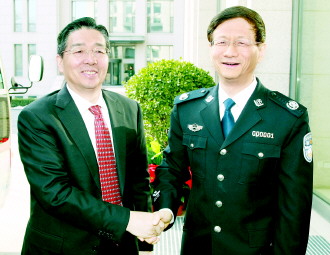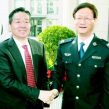
New Police Chief Shows Reliability But Not Power
Publication: China Brief Volume: 13 Issue: 3
By:

Following the Minister of Public Security Meng Jianzhu’s ascent to chair the Central Political-Legal Affairs Committee and the Politburo of the 18th Central Committee, a little-known provincial party secretary, Guo Shengkun, stepped up to take over Meng’s place at the ministry in late December (Xinhua, December 29, 2012). Guo, previously the Guangxi party secretary, may be one of the least-qualified picks to run the Ministry of Public Security (MPS)—and not because he lacks legal affairs experience. He simply has not been a part of the political milieu of China’s $100 billion-plus internal security apparatus and accompanying social management issues. It appears Guo is a politically-reliable and experienced manager with a visible cap on his advancement that is more likely to keep the MPS focused on supporting the party’s priorities than those of any political clique.
Guo, the twelfth minister of public security, spent most of his career in metals before becoming the Guangxi deputy party secretary in 2004 and the provincial party secretary at 17th Party Congress in 2007. This promotion to MPS chief, however, was what earned him full Central Committee membership; Guo was only an alternate member of the 17th Central Committee. He progressed through the Ministry of Metallurgical Industry, the state-owned China National Nonferrous Metals Industry Corporation, and the Aluminum Corporation of China before making the jump to provincial government. Guo also attended the Central Party School during the 1995–1996 academic year for the young cadres’ development course and later earned a doctorate in management (Ta Kung Pao [Hong Kong], December 28, 2012; Xinhua, December 26, 2012).
In contrast to his most recent predecessors, Guo’s career is relatively monotone. For example, Meng worked in agriculture before holding various posts in the Shanghai Municipal Government and Party Committee throughout the 1990s. He then served as the Jiangxi party secretary before going to Beijing to replace Zhou Yongkang in 2007. Zhou’s career began in the oil industry and started a transition in the late 1980s when he held positions on the party committee of the China National Petroleum Corporation and a municipal government (China News Service, November 15, 2012; Xinhua, March 4, 2003). He later served as minister of land and resources as well as party secretary of Sichuan Province. Zhou and Meng each had at least a decade more experience in governing. Perhaps Guo’s experience in running two large state-owned enterprises will give him the organizational expertise to manage one of China’s largest ministries (South China Morning Post, December 29, 2012).
If anything, Guo is representative of the recent political turn in the ministry’s leadership selection, even if he does not appear to be a heavyweight like Zhou and Meng. From the very first MPS chief, Luo Ruihuan, through the ninth minister, Jia Chunwang, every minister with one exception had substantial experience in policing, political-legal affairs, intelligence or clandestine party work pre-1949 (Shanxi Yellow River News Network, April 22, 2007). Guo’s odd background for taking up the mantle of public security chief perhaps is reminiscent of Jia Chunwang’s rise to Minister of State Security in 1985. At the time, Jia was a politico serving as a Beijing deputy party secretary without intelligence or police experience. With the benefit of hindsight, it seems Jia, like the three other state security ministers, was chosen because of his political reliability with respect to the party while still without strong factional alignments or the likelihood of developing a strong, independent political position (“Assessing the Foreign Policy Influence of the Ministry of State Security,” China Brief, January 14, 2011). If he is politically meek or heavily-reliant on a cross-factional coalition, then the 58-year-old Guo will be a relatively safe choice for all the political leaders for the next five, if not seven, years.
There is no reason, however, to think Guo will lead the MPS away from the priorities that seem to be dominating the post-18th Party Congress political discourse. At his first conference attended by all the provincial public security department chiefs, Guo noted the MPS needed to be supportive of the Xi Jinping’s anti-corruption push, stating the anti-corruption drive was vital to the “overall goal of building a peaceful China.” The minister also drew attention to the challenge of internal migration and urbanization as an important problem for preserving stability work—a challenge that required the MPS to participate in Premier-in-waiting Li Keqiang’s emerging urbanization program (Duowei News, January 20). At the same conference, Guo also highlighted the need to deepen informatization processes and make greater use of the MPS’s information networks to guide police work. The minister’s speech reiterated the policy of “public security informatization” (gong’an xinxihua), designed to integrate MPS information across the national, provincial and local levels to support investigations and adopt the Chinese version of intelligence-led policing (China News Service, January 20; “China’s Adaptive Approach to the Information Counter-Revolution,” China Brief, June 3, 2011).
The choice of Guo suggests further diminution of the domestic security apparatus in the corridors of power—even if not for the person on the street. He shows political reliability without obviously traceable loyalties. Looking at the prospects for Guo’s career, the MPS assignment punches another ticket for further advancement. With ministerial and provincial party secretary postings as well as graduate education, he seems to be well-suited for a Politburo post in five years at the 19th Party Congress at age 63. He conceivably could take over Meng’s post at the Central Political-Legal Affairs Committee or move out of the security system altogether. Guo, however, is only one of several likely changes at the MPS and watching the turnover at the vice–ministerial-level in the coming months ought to give a sense of the ministry’s working-level influence in Chinese policymaking.





